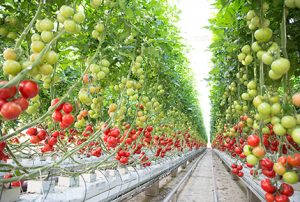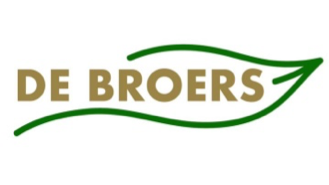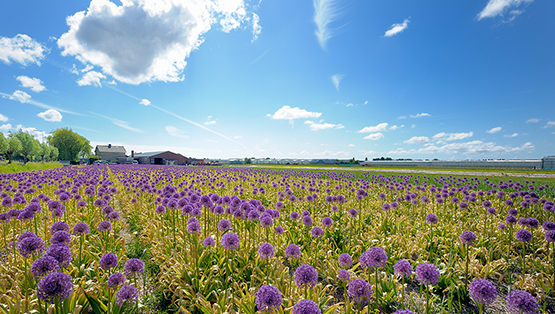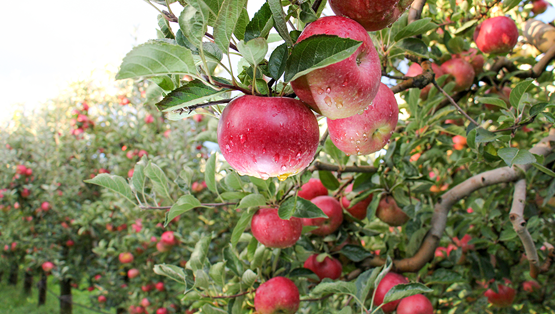Sustainable solutions
Sustainability is an essential value in every business. In our research we have discovered that multiple molecules from nature can play a major part in the use of sustainable solutions. In lowering the impact that certain business processes have on the environment we provide our customers important improvements that substantial lower the impact. Our sustainable solutions are of use in a wide range of business segments. Industrial, agricultural and scientific applications of our products and solutions support our international customers in reaching their sustainable objectives.
Industrial
In industrial processes our innovative solutions create important improvements to processes and products by adding natural compounds that are able to replace chemical compounds. This supports companies to differentiate and to increase their sustainability radar. Our solutions are of use in multiple areas from water purifying treatment to paper industry.
Agriculture
With our sustainable solutions we provide farmers effective tools for growing healthy crops. These innovative solutions contribute to a sustainable and responsible plant care in agriculture, greenkeeping and home and garden.
Basic substances
“Basic substances are not predominantly used as plant protection products but which may be of value for plant protection and for which the economic interest of applying for approval may be limited” according to Article 23 of EC1107/2009.
Basic substances as Chitosan hydrochloride are important in organic farming and play a major part in the transition of conventional farming using more sustainable solutions.
Chitosan
Chitosan hydrochloride is an abundant polycationic biopolymer. A nontoxic, fully biocompatible and biodegradable substance. Chitosan hydrochloride is applicable in multiple industrial and biotechnological applications. Predominant uses are biomedical applications, food preservative, packaging additive and wastewater treatment.
Chitosan activates and strenghtens the immune system of crops
 Chitin is an organic polymer polysaccharide, biosynthesized in several invertebrate animal species. It is the main compound of the exoskeleton of crustaceans, such as lobsters, crabs, and shrimp, and many other organisms, including insects and fungi. Chitin is considered one of the most abundant biopolymers and is regarded as one of the substances with highest production and degradation rate in the biosphere. Therefore, chitin plays an important role in the biogeochemical cycles of carbon and nitrogen, mainly in aquatic ecosystems. After the deacetylation of Chitin, the resulting Chitosan becomes polycationic in acidic media. This unusual quality for a biopolymer allows Chitosan to be capable of forming solutions and actively interacting with diverse molecules. The deacetylation determines most of the properties of Chitosan, including solubility, extent of swelling in water, susceptibility to biodegradation, bioactivity, and biocompatibility among others. Practically, the deacetylation has influence in all the functional properties of Chitosan. The molecular weight of Chitosan is a characteristic that has determinant influence in most of its functional properties. Together with the degree of acetylation, it is the most important chemical characteristics of Chitin and Chitosan.
Chitin is an organic polymer polysaccharide, biosynthesized in several invertebrate animal species. It is the main compound of the exoskeleton of crustaceans, such as lobsters, crabs, and shrimp, and many other organisms, including insects and fungi. Chitin is considered one of the most abundant biopolymers and is regarded as one of the substances with highest production and degradation rate in the biosphere. Therefore, chitin plays an important role in the biogeochemical cycles of carbon and nitrogen, mainly in aquatic ecosystems. After the deacetylation of Chitin, the resulting Chitosan becomes polycationic in acidic media. This unusual quality for a biopolymer allows Chitosan to be capable of forming solutions and actively interacting with diverse molecules. The deacetylation determines most of the properties of Chitosan, including solubility, extent of swelling in water, susceptibility to biodegradation, bioactivity, and biocompatibility among others. Practically, the deacetylation has influence in all the functional properties of Chitosan. The molecular weight of Chitosan is a characteristic that has determinant influence in most of its functional properties. Together with the degree of acetylation, it is the most important chemical characteristics of Chitin and Chitosan.


